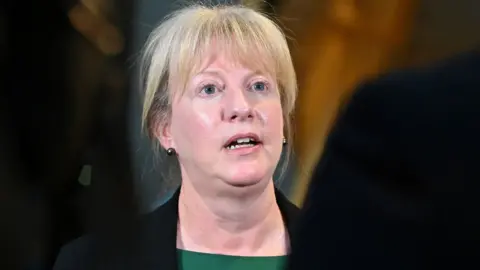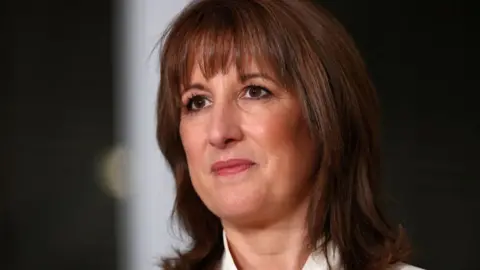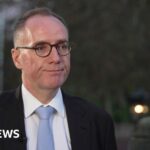Angus CochraneBBC Scotland
 Getty Images
Getty ImagesThe Scottish government will not increase income tax rates or introduce new bands in next year’s Budget, Finance Secretary Shona Robison has said.
However, decisions on thresholds for bands could mean that higher earners ultimately pay more tax.
Robison said she wanted to provide “certainty” after Chancellor Rachel Reeves announced the UK Budget.
Reeves defended her plans – which will lead to Scots paying more income tax and National Insurance – as “fair”.
Holyrood ministers have used their devolved powers to set up a distinct income tax system, with seven bands compared with the UK’s four.
Robison said the Scottish government would stick to its tax strategy, which set out plans not to change income tax rates or introduce new bands before the Holyrood election in May.
However, the finance secretary did not comment on pay thresholds.
“I’ve already set out in the tax strategy the position we wanted around stability with no changes to rates and bands,” she told told BBC Radio Scotland Breakfast.
“That is the position we had and that the position we maintain.”
The tax strategy also sets out a commitment that the majority of Scottish taxpayers should pay less income tax than people in the rest of the UK.
To fulfil that, the Scottish government would be expected to make changes to the starter and basic bands of income tax next year.
The tax strategy states that these bands should increase “by at least inflation”. It also says the threshold for higher, advanced and top bands will remain unchanged, meaning more people will pay a higher rate as their wages increase.
Robison said: “Well in Scotland, of course, a majority of taxpayers do pay less than in the rest of UK, and that’s a position we want to maintain.
“But we have asked those who earn more to pay a bit more, because we believe in that collective position that if you believe in society, then people have to make a contribution.
“And we believe those with the broader shoulders should make a bit more of contribution.”
 PA Media
PA MediaThe Scottish Fiscal Commission (SFC) cautions that difficulties in measuring income and tax figures mean it cannot provide a “definitive” answer about whether more Scots pay income tax than they would elsewhere in the UK.
When considering gross figures, it said the majority of Scottish taxpayers have been paying more income tax than they would have if they had lived elsewhere in the UK in each of the past two financial years.
But it also provided net figures which indicated the opposite.
For 2025-26, the SFC estimated that a majority of Scots would pay less income tax than they would elsewhere in the UK under both gross and net figures.
‘Chaotic’ UK Budget
Robison had previously warned that she may have to revisit her tax plans if Reeves hiked rates south of the border.
The chancellor had hinted at that possibility before U-turning.
Although such a hike would not directly affect Scotland, it would lead to an automatic cut in the Scottish Budget under devolved funding arrangements – leading to warnings of a potential income tax rise north of the border.
Instead, the chancellor announced an extension to a freeze on UK income tax and National Insurance thresholds until 2031.
Robison said that would not affect the Scottish Budget for 2026-27, which is due to be announced on 13 January.
The finance secretary described the UK Budget process as “chaotic” following weeks of speculation and a series of leaks.
She added: “But now we’re back to a bit more certainty then, of course, we want to return to position of our tax strategy.”
 PA Media
PA MediaReeves acknowledged that her tax and spending plans – including changes to cash Isas and levies on pensions – would “impact on working people”.
However, she told BBC Radio Scotland Breakfast that the changes were “fair”.
The chancellor has also been criticised by energy firms, who had called for a 78% levy on North Sea oil and gas profits to be lifted.
Reeves said the UK Budget would deliver an extra £820m to the Scottish government in the coming years.
She added: “But money always has to come from somewhere, and it is right that we ask the energy companies to make a fair contribution to fund public services in Scotland.”
Swinney ‘cannot be trusted’ on tax
At First Minister’s Questions at Holyrood, Scottish Conservative leader Russell Findlay said the SNP had broken its 2021 manifesto pledge not to increase income tax, adding that John Swinney “cannot be trusted” not to hike rates.
He called for the funding the Scottish government had set aside to mitigate the two-child benefits cap – which the UK government has now announced it will scrap – to be used to cut income tax, arguing that workers deserved to keep more of their “hard-earned money”.
The abolition of the cap is expected to save the Scottish government about £120m in 2026-27.
Swinney told Findlay that ministers had to be mindful of the economic context when making decisions on tax, citing the war in Ukraine and the “utter stupidity” of the Liz Truss mini-budget.
Scottish Labour leader Anas Sarwar told MSPs that the UK Budget would deliver “the greatest reduction in child poverty from a single budget this century”, while also pointing to a rise in the minimum wage.
Swinney welcomed the abolition of the two-child cap, but said the Labour government had to be “shamed into action”.




